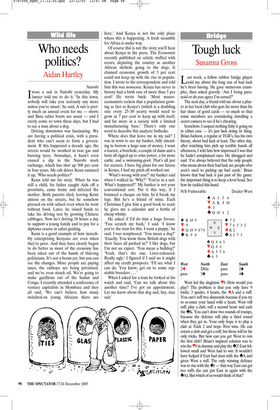I wore a suit in Nairobi yesterday. My lawyer told me
to do it. ‘In this town, nobody will take you seriously any more unless you’re smart,’ he said. A suit is pretty much an annual event for me — shorts and Bata safari boots are usual — and I rarely come to town these days, but I had to see a man about a dog.
Driving downtown was fascinating. We are having a political crisis, with a president who can’t seem to form a government. If this happened a decade ago, the streets would be swathed in tear gas and burning tyres. Nowadays, it hasn’t even caused a dip in the Nairobi stock exchange, which has shot up 300 per cent in four years. My cab driver Kenn summed it up, ‘Who needs politics?’ Kenn told me his story. When he was still a child, his father caught Aids off a prostitute, came home and infected the mother. Both parents died, leaving Kenn almost on the streets, but he somehow pressed on with school even when he went without food. Later, he raised funds to take his driving test by growing Chinese cabbages. Now he’s driving 18 hours a day to support a young family and to pay for a diploma course in safari guiding.
Kenn is a good example of how incredibly enterprising Kenyans are even when they’re poor. And they have clearly begun to do better as more of the economy has been taken out of the hands of thieving politicians. It’s not a boom yet, but you can see the changes. More people are paying taxes, the railways are being privatised, and we’ve even struck oil. We’re going to make gazillions out of the Sudan and Congo. I recently attended a conference of venture capitalists in Mombasa and they all said, ‘We can’t believe how many switched-on young Africans there are here.’ And Kenya is not the only place where this is happening. A fresh scramble for Africa is under way.
Of course this is not the story you’ll hear about Kenya in the press. The Economist recently published an article stuffed with errors, depicting the country as another African shithole going to the dogs. It claimed economic growth of 5 per cent could not keep up with the rise in population. I wrote to the correspondent and told him this was nonsense. Kenya has never in history had a birth rate of more than 5 per cent! He wrote back: ‘Most macroeconomists reckon that a population growing as fast as Kenya’s (which is a doubling rate every 25–30 years) would need to grow at 7 per cent to keep up with itself, and far more in a society with a limited manufacturing base.’ There’s only one word to describe this analysis: bollocks.
Where does that leave me in my suit? I was in town to see my banker, fully intending to borrow a large sum of money. I want a tractor, a borehole, a couple of dams and a farm all rigged up to solar power, a lot more cattle, and a swimming-pool. That’s all just for starters. I have big plans for our future in Kenya. I had my pitch all worked out.
‘What’s wrong with you?’ my banker said when I walked in. ‘Why?’ ‘You’re in a suit. What’s happened?’ My banker is not your conventional sort. Put it this way, if I bounced a cheque on him, he’d break my legs. But he’s a friend of mine. Each Christmas I give him a good book to read; he gives me a calendar and a bottle of cheap whisky.
He asked if I’d do him a huge favour. ‘You scratch my back,’ I said. ‘I know you’re the man for this. I want a puppy,’ he said. I was nonplussed. ‘You mean a dog?’ ‘Exactly. You know those British dogs with their faces all pushed in?’ I like dogs, but I’m not an expert. ‘You mean a bulldog?’ ‘Yeah, that’s the one. Liver-coloured. Really ugly.’ I figured if I said no it might affect my credit prospects. ‘I’ll see what I can do. You know, get on to some reputable breeders.. . ’ When I asked for a loan he looked at his watch and said, ‘Can we talk about this another time? I’ve got an appointment. Let me know about that dog and, hey, nice suit.’


















































































 Previous page
Previous page